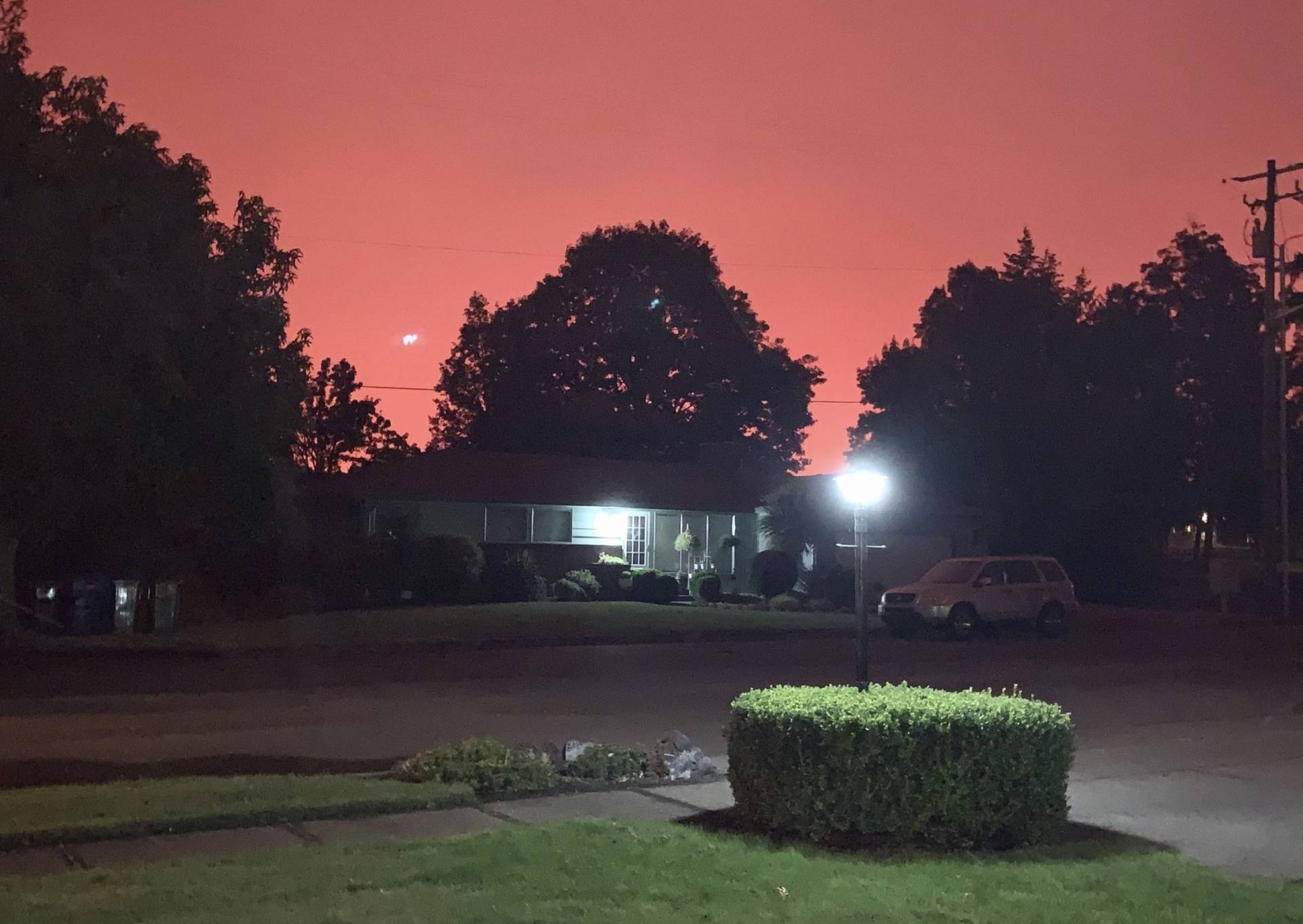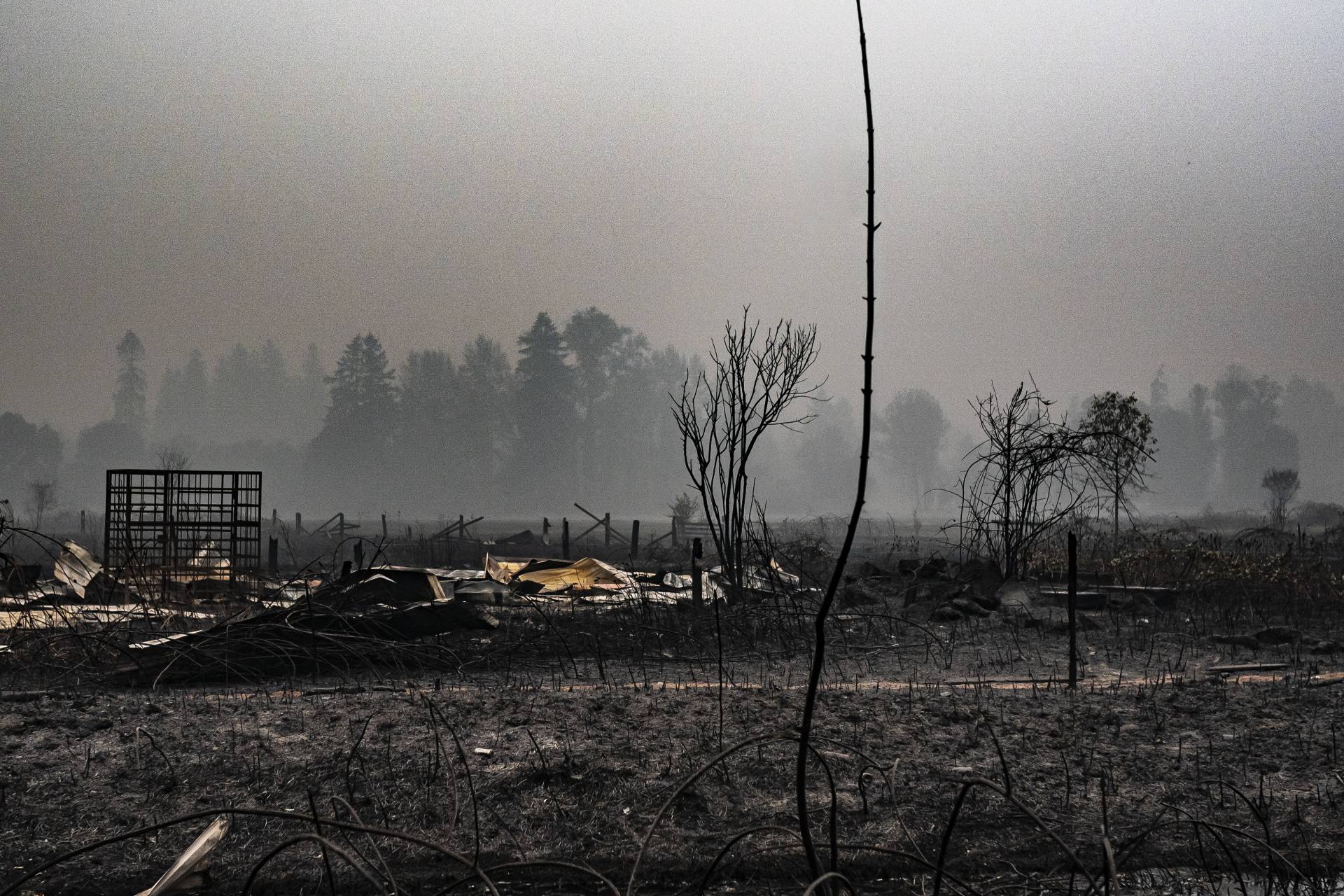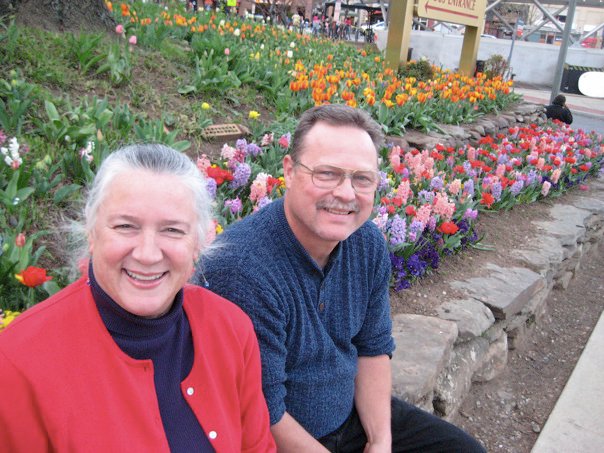In part because Oregon, usually, gets a lot of rain.
"We knew it rained a lot," Corinne said. "And I wanted to come up here because I just figured it would be so safe."
But after a hot summer and a weekend that saw hot, dry weather up and down the West Coast, fires began to spring up everywhere — including in Oregon. The closest to the McCourt's is the Beachie Creek Fire, which has now burned more than 180,000 acres east of Salem.
On Labor Day evening, the sky started to look too familiar.
"The winds picked up. And smoke was everywhere, and it was very eerily reminiscent of the morning of the Camp Fire. Exactly the ... same weather experience and the smoke," Bruce said. "And Corinne and I just looked at each other and said, 'This can't be happening now.' "
After a warning from their neighbor, the couple began packing to flee a wildfire, again.
But Corinne found herself frozen. They'd lost everything in the Camp Fire and had spent years replacing furniture and buying new dishes. Now, she was faced with the prospect of losing it all again.
"I just couldn't move," she said. "I mean, you know, I just kept looking at this and thinking: What do I do?"
'Irrational Things Happen Sometimes'
While public health researchers are still trying to understand the health impacts from the Camp Fire, according to trauma and mental health experts, feelings of stress and anxiety are normal for survivors of traumatic events, like natural disasters. And big events, like wildfires, can reopen old wounds and cause people to relive difficult and frightening experiences.
Jesse and Laurel Merz recently moved to Oregon this past June. Initially, after their house was destroyed in Paradise, they were able to find a new place in Chico, but ended up moving to Oregon anyway.
At first they considered Southern Oregon, but said there was "too much fire there" and settled on Eugene, about two hours south of Portland.
Then the Holiday Farm Fire started. And even though it was nearly an hour away from their house, Laurel started getting nervous.
"As soon as they said that there was a red flag warning ... the hair on the back of my arm started to raise," she said.
Laurel said that even though she rationally knew that the Holiday Farm Fire was dozens of miles away, it was hard to stop thinking about. She knew the fire would have to jump two rivers and a huge freeway to threaten their new home. So it should be safe.
But she'd also felt that way about the Camp Fire, before it burned down her home and destroyed the hospital she worked in.
"My irrational brain has been correct before. Because irrational things happen sometimes," she said.
Mental health experts, like psychologist Daniela Domínguez, say it's important to pay attention to feelings of anxiety and hypervigilance, because they may be signs of a trauma-related reaction to what's happening.
"It's really important for us to pay attention to those signs," Domínguez said. Because if we don't attend to those feelings with "attention, love, care and community" it could get worse, and lead to health concerns.
And it's important to note that not everyone experiences these traumatic events equally. For instance, those who identify as Black, Indigenous or people of color may have experienced traumatic events that "have made a deep impact on the way they're moving through spaces," on top of concerns about wildfires, Domínguez said.
In addressing those feelings, Domínguez said it's important to remember the following:
- Validate your experience: It's important to acknowledge your feelings, Domínguez said, so you can help yourself — and others — work through it.
- Make sure you're in a supportive environment: "Well-being depends on whether relationships and the environment in which we are moving are healthy or supportive or responsive," she said.
- Normalize your stress: While in the midst of a difficult event, you may be tempted to discount your own feelings. But Domínguez said, considering the state of the world, it's normal to be stressed out and anxious.
- Take the time you need: Think of trauma as a psychological injury, Domínguez said. So if you need to take some time to take care of yourself, you should.
- Talk to a professional: If you've gotten to the point where you're experiencing a level of stress that is impacting your help, Domínguez said it may be time to speak to a mental health professional. Here's where you can find affordable, culturally competent therapy in the Bay Area.



